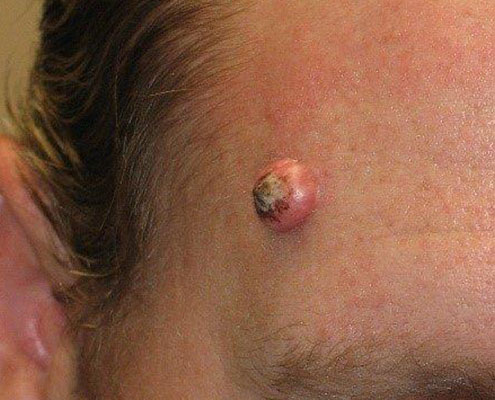Squamous Cell Carcinoma Treatment and Skin Cancer Removal
Squamous cell carcinoma (SCC) is a common skin cancer. It results from the uncontrolled growth of the superficial skin cells. It is most common on the face, ears, nose, scalp, lips, arms, legs, and hands. It can also occur under fingernails and toenails and on the genitals. It is most common in older people but can occur in young adults. The most common cause of squamous cell cancers is repeated sun exposure and sun burns, as well as tanning bed use. Other causes are a suppressed immune system, radiation treatments, certain chemical exposures, smoking, and injuries to the skin. Squamous cell tumors indicate an increased risk for other types of skin cancer.
Although usually limited to the skin, squamous cell carcinoma can spread (metastasize) to other areas of the body and to lymph nodes and become a very serious medical problem. Tumors that develop on the lips, ears, nose and genitals have a particularly high risk to spread. Most tumors grow slowly over time, but some can develop rapidly over several weeks.
If treated early, most squamous cell cancers are curable. If one is suspected, a dermatologist will do a biopsy by taking a piece of the tumor and examining it under a microscope. Treatments include: simple surgical excision, Mohs surgery, surgical skin scraping, radiation, or the application of prescription medical creams.
Our dermatology centers across Arcadia/Phoenix, Surprise, and Peoria specialize in effective treatment and removal options for squamous cell carcinoma. Our dedicated team of dermatologists is experienced in addressing the unique challenges posed by squamous cell carcinoma, utilizing advanced techniques and personalized treatment plans to ensure the best possible outcomes for our patients. From early diagnosis to comprehensive treatment, our facilities are equipped to provide the highest level of care.
Frequently Asked Questions For Squamous Cell Carcinoma
- What are the available treatment options for squamous cell carcinoma? Our dermatology experts offer a range of treatment options for squamous cell carcinoma, including surgical excision, Mohs surgery, radiation therapy, and topical prescription creams. The choice of treatment depends on the specific characteristics of the tumor and the patient’s individual needs.
- Is squamous cell carcinoma curable with early treatment? Yes, when detected and treated early, squamous cell carcinoma is highly curable. Our experienced dermatologists emphasize timely intervention to ensure the best possible outcome and minimize the risk of complications.
- Can squamous cell carcinoma spread to other parts of the body? Yes, although usually confined to the skin, squamous cell carcinoma has the potential to spread to other areas of the body and lymph nodes, particularly when located on certain high-risk areas like the lips, ears, nose, and genitals.
- How does Mohs surgery contribute to effective skin cancer removal? Mohs surgery is a specialized technique that offers precise removal of cancerous tissue while preserving healthy surrounding skin. This procedure is especially beneficial for squamous cell carcinoma removal on delicate or cosmetically sensitive areas.
- What role does a dermatologist play in squamous cell carcinoma treatment? Dermatologists play a crucial role in squamous cell carcinoma treatment, from accurate diagnosis through to developing a tailored treatment plan. Our team is dedicated to providing compassionate care and guiding patients through every step of their treatment journey.



